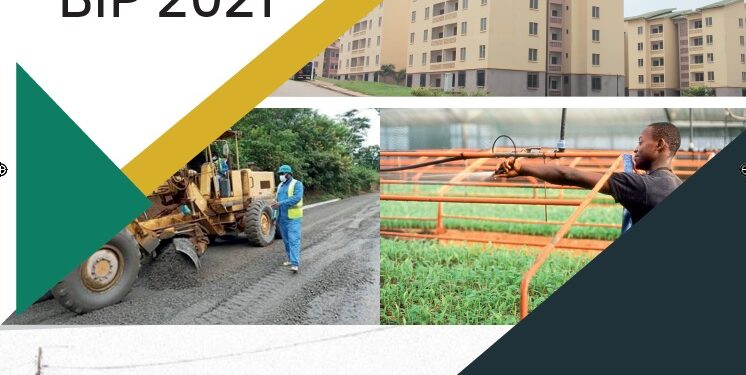The Public Investment Budget (PIB) for the 2021 financial year comes in a context marked by the operationalization of the National Development Strategy 2020-2030 (NDS30), the continuation of the response plan against the COVID-19 pandemic, the organization of the 2021 African Nations Championship (CHAN) and the 2022 Africa Cup of Nations (CAN), the maintenance of a security watch over the entire National Territory and the implementation of the reconstruction plan in regions affected by security crises.
Emphasis is also placed on consolidating the achievements of the Economic and Financial Program (PEF) concluded with the International Monetary Fund (IMF) as well as those of the agreements signed with other Technical and Financial Partners.
For the 2021 financial year, the PIB amounts to FCFA 1406.5 billion in Commitment Authorizations and FCFA 1352.0 billion in Payment Credits.
Supported mainly by the infrastructure sector, with a proportion of 64.5%, this budget reflects the Government’s constant desire to boost the socio-economic development of our country, in accordance with NDS30.
In order to ensure optimal execution of the 2021 PIB credits, MINEPAT plans to strengthen the existing mechanism for monitoring the execution of the BIP and promote ownership by stakeholders of the execution chain, contracting procedures and physical and financial execution of the PIB, through the practical guide titled “PIB 2021: the keys to good execution”.
The PIB execution monitoring system
The PIB’s physical and financial execution monitoring system is a set of bodies framed by regulatory texts.
Established at national and local level (region, department and municipality), the administrative and participatory mechanisms have the overall objective of allowing optimal physical and financial execution of the PIB at the end of the fiscal year.
Several specific objectives contribute to the achievement of this overall objective. These include, among others:
– Provide information on the status of the physical and financial execution of PIB projects within the required deadlines;
– Allow closer collaboration between stakeholders in the execution of the public investment budget;
– Remove obstacles to the proper execution of public investment projects;
– Resolve at the level of regions / departments / municipalities, the problems identified in the execution of projects with decentralized management and those falling under the general allocation of decentralization Transferred Resources;
– Improve the quality and volume of public investments made.
The practical guide titled “2021 PIB: Keys to Smooth Execution”.
2021 PIB: keys to smooth execution is a practical guide, drawn up in line with the overall public finance reform plan in Cameroon, promoting the optimal implementation of all of the BIP’s projects.
It contributes to the appropriation of procedures and defines the role of each stakeholder in the PIB execution chain.
To do this, it is subdivided into five (05) chapters, namely:
Chapter I: Contextual aspects and reference framework for the proper execution of the PIB;
Chapter II: Main stakeholders in the execution of PIB projects;
Chapter III: Main procedures for the execution of PIB projects;
Chapter IV: Follow up Mechanism of the execution of PIP projects;
Chapter V: Some practical information sheets on certain procedures of the execution of the PIB.
(Source: MINEPAT)








